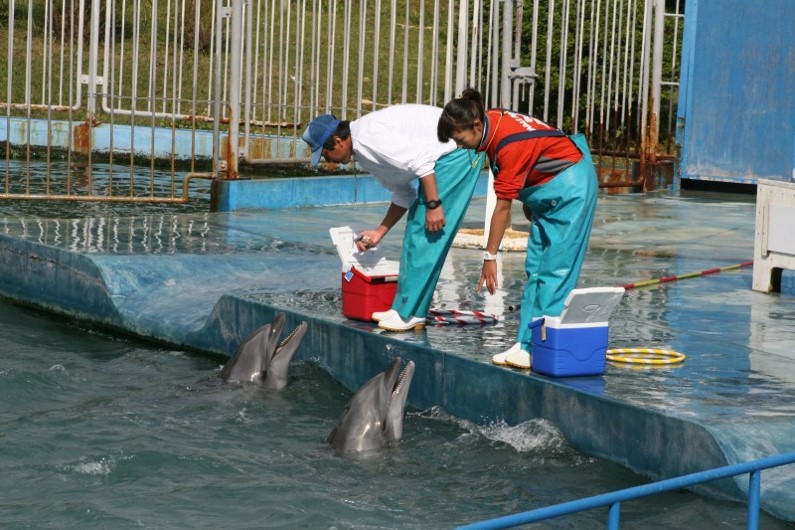
The dolphin drive hunt season commences annually in early September and ends the beginning of March. Our Academy Award-winning film, The Cove, exposed this practice of chasing and herding small whales and dolphins from sea into the confines of a killing cove, where these sentient and social creatures are sometimes held for days before being selected alive for captivity or slaughtered.
The entire process of chase, handling, and slaughter is excruciatingly inhumane. Dolphins are traumatized by the intense pursuit by high-speed vessels, family groups are separated during the chase, and direct injury or mortality may occur as they are forcibly herded into the cove. After the chase, dolphins are then subjected to a brutal selection and killing process.
Annually, upwards of 2,000 dolphins of mixed species can be taken, including bottlenose dolphins, short-finned pilot whales, spotted dolphins, melon-headed whales, false killer whales, and striped dolphins, among others. The toll on dolphin families in the wild is incalculable as populations are shattered by these round-ups, captures, and slaughters.
While our film, The Cove, catalyzed global condemnation of these annual hunts, the best possibility to end them rests with the Japanese people. Bearing witness to these hunts is important, but our words and actions are not as effective as the groundswell of voices against these activities within Japan.
Beyond our support for monitoring activities at the cove, OPS is supporting Japanese activists on the frontlines who are working to raise awareness about these hunts, including outreach to authorities and captive dolphin facilities. Japanese protestors are holding demonstrations outside the Taiji Whale Museum, handing out flyers to patrons, and marching through town to the harbor where the drive hunt boats are launched.
We are encouraged and inspired by the rise in activism within Japan in response to the growing awareness around these hunts, launched in part by our important film. However, the tide will turn only when Japanese policymakers face the full force of international pressure and also look inward to what the people of Japan want for the 21st century. Although awareness about these hunts has increased, and a grassroots movement is beginning to emerge from within Japan, the hunts go on.
We support all of our brave partners on the ground in Japan working to end the drive hunts and captivity. These motivated activists, academics, whale-watchers, artists and other whale and dolphin lovers who are willing to challenge the system to fight for the lives of these special creatures have our greatest respect. The future of these hunts is in their hands.
We are also supporting outreach efforts in the Faroe Islands, where the annual ‘grind’—another form of drive hunt—takes place in over multiple coves throughout these rugged islands, killing an average of 600 long-finned pilot whales annually. OPS is supporting artist and filmmaker, Ran Levy-Yamamori’s, outreach with Faroese children and the release of his documentary, Bridging Troubled Waters (stay tuned!)
What you can do!
Don’t buy a ticket. When you support an aquarium or marine park that holds whales and dolphins in captivity, you are part of the global demand that perpetuates dolphin captures. Your consumer choices impact whale and dolphin protection worldwide.
Follow our colleagues in Japan. Consider a donation to Animal Liberator (LIB) or Life Investigation Agency (LIA), our partners on the ground in Japan working to end the dolphin drive hunts. Follow their activities on the ground in Taiji and support all Japanese activists working to raise awareness and end these brutal hunts in Japan.
Peaceful protests in Japan. If you are traveling to Japan, or live in Japan, Mineto Meguro (LIB) has produced a helpful guide for activists who want to document and peacefully protest the dolphin hunts in Japan. Click here for the Japanese version.
Voices of Taiji. If you are an activist working in Japan and would like to be profiled on our Voices from Taiji blog, please contact us so that we can share your important story and work.
Share The Cove with your friends. You may know about our Academy award-winning film, The Cove, but do your friends? Contact us for screening opportunities, and if you are an educator, screening links are free.
Japan Dolphin Day. Stand with Dolphin Project and global partners in acknowledging Japan Dolphin Day (now called Dolphin Defender Month) around September 1st of every year to mark the beginning of the dolphin drive hunt season.
Watch the trailer for Bridging Troubled Waters, and stay tuned for the release of this important film. Supported by OPS, the film documents the potential for art and children to shape a more hopeful future.